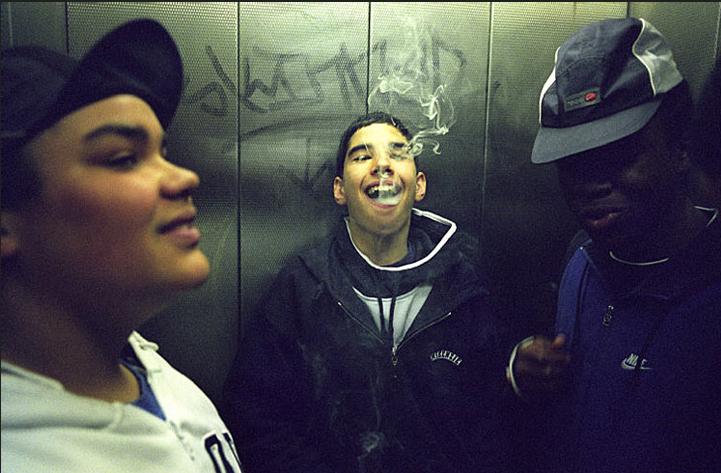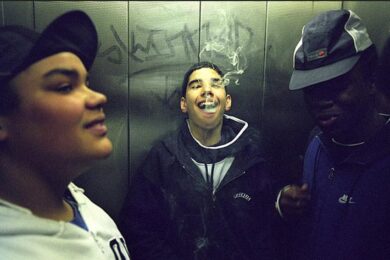My love of grime goes back to 2001-2002 when I moved to Peckham and got my first car: these two factors are important, and related. A car got me mobile, and meant that many a night could be spent endlessly driving the city usually to and from the rock gigs that I was reviewing for magazines like Kerrang!
As any Londoner knows, the airwaves have long been jammed with pirate signals, especially in South and East London. And so I drove the city, my ears still ringing from that night’s show, shifting through the gears as I drifted from one crackling pirate catchment to the next, heading south over Vauxhall Bridge and back into familiar territory, the urban sprawl laid out like some twinkling Ballardian vision dusted in dirt and bedecked with discarded fried chicken bones. The soundtrack was a raucous clatter pumped from the tower block rooftops, angry alien music set to new 2step breakbeat timings with a litany of threats, insults and aspirational boasts skittering over the top of it all.
I’d already previously fallen for the sounds of pirate station jungle when I was staying at a squat in Kennington during my first forays into London in the mid 90s. Jungle was like nothing I’d heard before, and Original Nuttah still ranks as one of Top 10 favourite songs. I remember trying to convince some friends during the days of Britpop that jungle was the punk rock we had been waiting for. But when you come from the north-east of England, where music arrives two or three years after it has hit the south-east, it wasn’t an easy task.
But this new 00s grime stuff was even madder. The rise of it also coincided with the rise of Youtube and file-sharing sites, so sounds like this typical freestyle clip from N.A.S.T.Y. Crew (recorded in “shit alley, Plaistow”) could literally be relayed straight from the street. I remember the first time I heard Dizzee Rascal in early 2003, via, oddly, a trip away with Biffy Clyro , whose then-publicist was raving about this East London teenage MC that XL had just signed and who was so green he had never even been to the West End, I distinctly remember thinking: this is great, but you can hear this raw MC style and jagged beats on any given night of the week in my car. All you need is some petrol money and a big biffter to enjoy it.
I hope I don’t sound like one of those patois-spouting dicks who pretends to be down with the local rude boys just because he likes a bit of grime or lives in a notorious postcode. Racial tourism isn’t my thing; I come from the middle class English suburbs, which is exactly why grime appeals. Living in Peckham I’d previously been blocked from walking down certain streets, for being white, for having “crap hair”, but when you hang around a place like Peckham – or Brixton or Bow, where grime originated, or wherever – long enough, you start to get a feel for the place. And when you’re utterly broke and living off end-of-the-day vegetables from Rye Lane market, and every bit of income feels like a hustle, albeit a legitimate one, you start to blend in and feel like part of scenery. I still maintain I never got robbed on my long, time-killing walks around SE15 because you only had to look at me to see that my pockets were empty, my mobile not worth robbing.
I knew nothing about the creators of grime and never went to any of the soundsystems under the railway arches but I liked what the pirates played. Because unlike my day job as a music writer travelling around investigating and relaying the back stories and opinions of alternative rock bands, the music was all that mattered. When a debuting Dizzee came into the Kerrang! office to be interviewed about his love of metal and I never got to meet him, I was just as gutted as if Axl Rose has swung by. Grime was the music from where I lived. It was the newest thing; an exciting hinterland full of lyrical riddles to solve. The late Tony Wilson saw the potential in grime in 2004 when he called new signings Raw-T his “third band”, after Joy Division and the Happy Mondays.
When Lethal Bizzle appeared at the Download festival years later, I was excited for him and the crowd: here was a chance for the metal kids to have their heads turned towards a genre equally as raw, intense and base as early Slipknot shows. After all, this was the guy who wrote ‘Pow!’, and was a member of one of London’s best grime best crews, More Fire, whose 2002 single ‘Oi!’ was probably the first grime tune I heard on (non-pirate) radio. I mean, if you liked the musical trepanning of The Dillinger Escape Plan how could you not be similarly buzzing off the physical sensation of loud bass booming up through your legs, and the very real possibility of violence, right? Sadly Lethal Bizzle was met with a sea of middle fingers and a shower of bottles and even some cad bearing a hand-written sign saying ‘BIZZLE YOU BLACK CUNT’, all from a bunch of well-scrubbed kids who wouldn’t last five minutes if you dumped them on the North Peckham estate at midnight. My opinion about bottle throwers is: if you took away the fifty thousand people around you, would you still be doing it?
And that’s what riles me off about certain factions of the metal and punk worlds: that tribal, territorial pissing and general unwillingness from some to hear the good stuff from other genres. Don’t metallers suffer enough prejudice themselves for the way they look without having to dish it out to others? Half of them would have been bopping along to that summer’s two biggest tunes – Dizzee Rascal’s ‘Dance Wiv Me’ and ‘Bonkers’ –in the privacy of their bedrooms anyway or getting down to festival favourites Skindred, one of few metal bands who fuse disparate sounds with style and skill.
Bottle-throwing at festivals isn’t necessarily a race issue of course. Everyone from Meatloaf and Daphne & Celeste to multi-millionaire sellers like My Chemical Romance and 50 Cent have been on the receiving end of this inane British summertime tradition but when it’s one black dude facing down a 99% per cent white crowd it doesn’t look good. There’s also probably a separate discussion to be had about rock & roll as performance is an inherently fascist construct. As my dictionary put it: “fascist governments are dominated by a dictator, who usually possesses a magnetic personality, wears a showy uniform, and rallies his followers by mass parades”. But we’ll save that digression for another time.
As it happened, Bizzle didn’t seemed unduly rattled and has shown by way of Clash-sampling singles, his hook-up with hardcore band Gallows (themselves vocal supporters of grime) and the recent re-release of Pow 2011, now a “kettling anthem” featuring some of grime’s finest including the great originator of the ice-cold Eskibeat Wiley, Chipmunk, Kano, JME and others, that he has broader vision for his music. The metal world meanwhile got lumped with Paramore.
So that’s why I first fell for grime, and why it’s hardest songs are as heavy as music gets. It is raw, it’s occasionally dangerous and some of it – only some of it, mind – is made by some proper fucking headcases. It’s proof that the youth aren’t apathetic. And the good thing is, all it takes is a shout out on Twitter on Facebook for tunes to start arriving from people with far better knowledge about the scene than me. God knows, who Chain Of Command are, but a mate sent me the Sabbath-sampling ‘Rough State’ literally one minute ago, and already I’m feeling it. Because sometimes music is beyond intellectualisation and analysis; you just have to sit back and let it move you. It’s something that people who write about music might want to remind themselves of from time to time. Stop dissecting and instead feel it, then try and translate feeling into words.
I live in the countryside now. I hear cockerels instead of sirens of a morning and I’ve not been called a batty boy once. I can’t say I miss the hectic side of Peckham hugely but I only have to listen to Giggs’ immense ‘Look What The Cat Dragged In’ to go straight back there. Grime is a Top 10 entity now, and everyone knows when something goes mainstream it loses… something. I’d argue that grime peaked around 2005 with the Run The Road Volume compilations, and in one fast decade we’ve gone from the intense vibes of an unknown Dizzee Rascal squaring up to Crazy Titch (currently serving a minimum of 30 years for murder), to the safe day-time Radio 1 sounds of Tinchy Stryder, Tinie Tempah and – well – Dizzee Rascal all sitting pretty in the charts. In 2011 grime is something else entirely. But if you happen to live in the rural Yorkshire hood and hear a late night BOOM-BOOM rumble in your street it might me passing by, in search of a new pirate frequency, blood.
Ben Myers’ book based on the life of Richey Edwards, Richard is out now. Read an interview with him and an excerpt here



